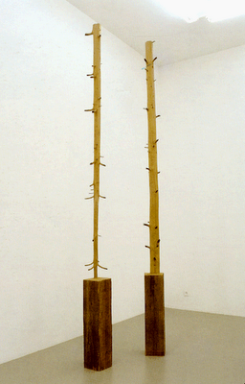
This is of my favourite exhibits at the Tate Modern Gallery in London, sculpted (if that’s the right word) by Giuseppe Penone. Here’s a summary from the description:
Out of processed planks of timber the ancient technique of carving draws out the shape of a tree, wood removed ring by ring until twelve metres of tree – bottom to top and top to bottom – is exposed within two sawn pieces of wood, initially intended for construction.
Sculpture is engaged in a reconstruction through deconstruction, a turning back of the clock, pulling back to reveal the raw within the contained.
I love this work because it speaks to me of the stories which lie within. It says that with careful skill, the layers of what looks on the surface to be an unremarkable object can be peeled away to reveal years of history, detail and in this case beauty. In the case of the tree on the left– it revealed truth that the world was actually the other way up!
If you’re anything like me, there will have been times when you have looked through the write-up of a post-project review, or lessons learned summary, and wanted to ask questions of the document in your hand, or on your screen. And when we try to ask a document a question, it will always be a one-sided conversation!
Asking the right questions is the core activity for anyone facilitating a learning review.
Naturally it’s better to learn whilst doing, rather than try to get a team to remember at the end of a significant project (and not post-rationalise events!) – but all too often you are confronted with a “learning after doing” scenario. So how do you make the best of that situation? So what types of questions should we consider? Here are 20+ questions and some techniques which I find helpful.
Questions to establish the facts and re-set the context.
- Can anyone talk me through the original plan and objectives of the project?
- Did these change over time? (When, How, Why?)
- Who was responsible for this task, and did this responsibility change? (Why, How, Who?)
- How well did the project achieve its aims?
- What were the areas of deviation from the plan, and what were the reasons?
Questions to surface the notable high and low spots.
- Think back over each phase of the project: What did the team do well during this time?
- What was the most professionally satisfying part of the project for you?
- What should have gone better?
- What were the most frustrating parts of the project?
- Were there any early warning signs which we should have spotted? What should we look out for in future?
- If you could wave a magic wand and change anything about the project, what would you change?
- If you had to give a mark out of 10 for the project outcome/output – what would that be? What would make that a 10?
- If you had to give a mark out of 10 for the project process – what would that be? What would make that a 10?
- How many marks of 10 would your customers/contractors give it?
- Consider the Emotional Rollercoaster as a technique.
- Michael Greer’s PM Resources article has a number of more specific questions for design and implementation phases.
Questions to dig deeper
- Why? The 5-why’s technique is a very powerful way of peeling away the layers and getting closer to the root, but try not to be too mechanical about it! There’s more than one way to ask “why” to make it sound less like an inquisition – for example:
- “What makes you say that?”,
- “What led you to that decision?”,
- “Why do you think that might be?”,
- “Was there a reason for that?”…
- Can you give me an example of that?
- Can you share a story which illustrates this? (Capture these on video/audio if possible.)
Questions to construct advice, recommendations or principles for the next team.
- What would you say to a colleague about to start the same kind of project, to help them repeat your success?
- Imagine you were having a drink with a close friend, and they mentioned that they were about to take a similar approach to the one you took – what advice would you give them to help them avoid the pitfalls you encountered? Specifically, what should they do or not do?
- If you could go back in time to the start of this project and shout something in your ear, what three pieces of advice would you give yourself
Questions for de-risking discussions about failure. (Works best with multiple projects represented.)
- Imagine for a minute you were writing a guide on how to screw up projects of this type – what would your top tips be?
The truth is in there, if we can ask the right questions…

December 16, 2013 at 7:53 am
[…] Eleven open questions […]